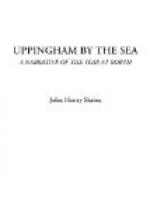“We, the undersigned old members of Uppingham School, now resident at Oxford, write to express our deep sympathy with the Headmaster and Masters of Uppingham School in the great difficulties with which they have lately had to contend. Feeling as we do, that though we have left the school, we still, in the truest sense, belong to it, we can but testify our gratitude to those whose courage and skill have carried it safely through such a crisis, and converted a great misfortune into a proof that it is strong enough to defy accidents. Our confidence in the Headmaster is, as always, entire and unabated, and we are sure that the school which he has so successfully led to Borth will come back under the same leadership, with its vigour undiminished, to its home at Uppingham.” {66}
In reply the Headmaster said, addressing himself to the memorialists and the school, “the past and future (for what we are doing has a past and future), I thank you for this with all my heart, for this which you call ‘a slight thing.’ It is a slight thing; but yet, like a flag which armies have rallied round and have died for, it can give spirit and endurance and confidence. Yes, it is true, as you say, that these have been hard times, as those know who have had day by day to watch ruin coming closer and closer, with no hope, no room for escape. Like men in the story tied to the stake in front of the advancing tide, we had to see wave on wave coming up to bring a slow but sure destruction.” Then, after speaking of the incidents which ended in our coming to this spot, he continued: “We have been brought by our troubles much before the eyes of the public. They speak of ’the fierce light that beats upon a throne,’ but that is hardly so intolerable as the fierce light that beats upon a great calamity. Yet I trust that fierce light may prove to the school a refining fire. Certainly the present school has behaved worthily under their novel circumstances; they have shown themselves true sons of Uppingham. You of the past school see round you your successors, and you may be proud of them; at least we have suffered no trouble through those you see before you here.
“The end of all this which of us knows? But we have faith that it shall be good. Though all seems to fail and perish, all our work to die, yet I am sure there shall be no real death of the life of the school, but that it shall have its resurrection.”




